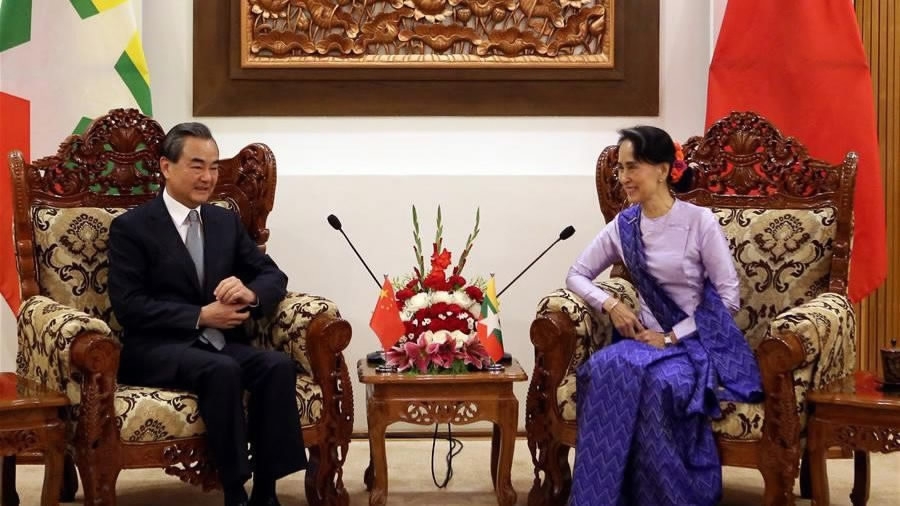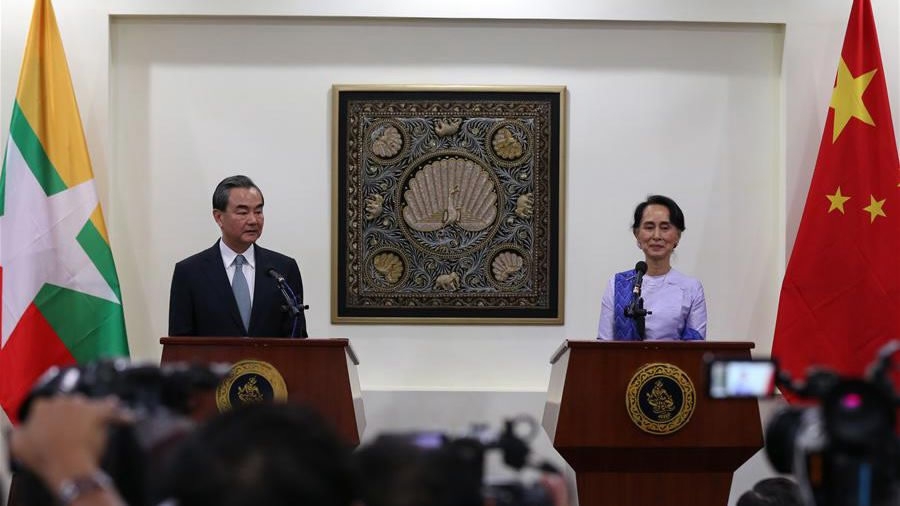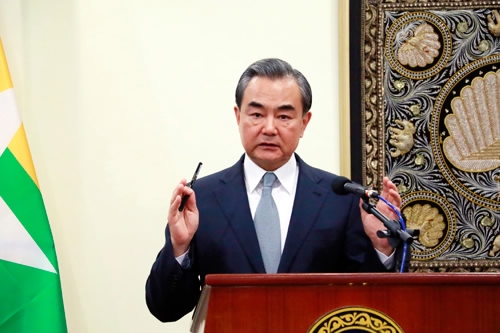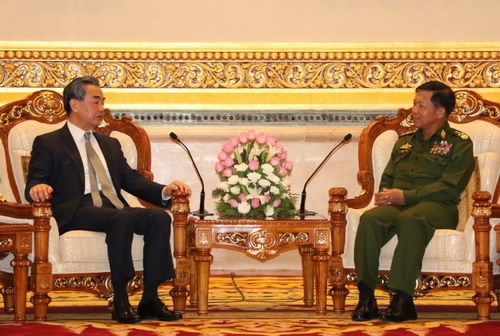
Politics
11:24, 20-Nov-2017
China proposes three-phase solution to Rakhine problem: FM
CGTN

China has proposed a three-phase approach to solving the Rohingya refugee crisis involving Myanmar and Bangladesh.
Visiting Chinese Foreign Minister Wang Yi outlined China's position at a news conference with Myanmar's State Counselor and Foreign Minister Aung San Suu Kyi on Sunday.
The first phase, Wang said, is to achieve a ceasefire so that local residents can no longer be displaced. Through joint efforts, the ceasefire has been in place.
Secondly, the international community should encourage Myanmar and Bangladesh to keep talking in a bid to find a feasible solution, he said. The two countries have reached an initial agreement on the repatriation of hundreds of thousands of refugees who have fled to Bangladesh from Myanmar's Rakhine state.

Chinese Foreign Minister Wang Yi (L) meets with Myanmar's State Counselor and Foreign Minister Aung San Suu Kyi in Nay Pyi Taw, Myanmar, on November 19. /Xinhua Photo
Chinese Foreign Minister Wang Yi (L) meets with Myanmar's State Counselor and Foreign Minister Aung San Suu Kyi in Nay Pyi Taw, Myanmar, on November 19. /Xinhua Photo
The third phase is to find a long-term solution. Stressing that poverty is the root cause of turbulence and conflict, the Chinese foreign minister called on the international community to support poverty alleviation efforts in Rakhine state.
China believed that the Rakhine issue can be addressed by a solution acceptable to both Myanmar and Bangladesh through consultations between the two neighboring countries, Wang told the news conference.
The international community and the United Nations Security Council should encourage such efforts by creating conditions and good atmosphere for the consultations, he said.

Chinese Foreign Minister Wang Yi speaks at a news conference in Nay Pyi Taw on No. 19. /MOFA Photo
Chinese Foreign Minister Wang Yi speaks at a news conference in Nay Pyi Taw on No. 19. /MOFA Photo
The Chinese top diplomat said the Bangladesh government pledged to continue bilateral talks with Myanmar over the issue when he visited Dhaka on Saturday. Myanmar also expressed the same attitude, he said.
Development can lead to stability, Wang said, adding that China's three-pronged proposal had been backed by both Bangladesh and Myanmar.
Myanmar President U Htin Kyaw also met Wang on Sunday, saying his country appreciated the Chinese stand on the Rakhine problem and is willing to negotiate with Bangladesh along the lines proposed.
The president also said the country stands ready to join hands with China to speed up the development of the China-proposed Belt and Road Initiative.
Myanmar also appreciates the building of a China-Myanmar economic corridor and intends to actively integrate with the Chinese side over the project, said the president.
On the same day, Wang also met the Commander-in-Chief of Myanmar's Defense Services Senior General Min Aung Hlaing.

Chinese Foreign Minister Wang Yi (L) talks with Myanmar's Commander-in-Chief of the Defense Services Senior General Min Aung Hlaing in Nay Pyi Taw on Nov. 19. /MOFA Photo
Chinese Foreign Minister Wang Yi (L) talks with Myanmar's Commander-in-Chief of the Defense Services Senior General Min Aung Hlaing in Nay Pyi Taw on Nov. 19. /MOFA Photo
Wang spoke highly of the role the Myanmar army has played in the country's development and stability and said the army is also a staunch force in promoting China-Myanmar friendship.
Min Aung Hlaing, for his part, said China has been providing strong support and assistance for a long time to help maintain peace and stability and promote economic growth in Myanmar.
He said the army is willing to continue playing an active role in carrying on the fine and friendly tradition of the exchanges between the Myanmar and Chinese armies so as to usher in a new era of relations.
The Chinese foreign minister will participate in the 13th Asia-Europe Meeting (ASEM) foreign ministers' meeting in Nay Pyi Taw on Monday and Tuesday.
2977km
to Myanmar
Source(s): Xinhua News Agency

SITEMAP
Copyright © 2018 CGTN. Beijing ICP prepared NO.16065310-3
Copyright © 2018 CGTN. Beijing ICP prepared NO.16065310-3